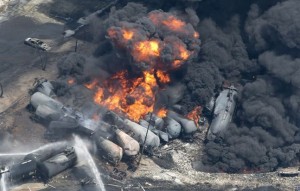This is a guest post by Phil Mattera.
Canada’s Transportation Safety Board is far from reaching a conclusion on what caused an unattended train with 72 tanker cars filled with crude oil to roll downhill and crash into the Quebec town of Lac-Megantic, setting off a huge explosion that killed at least 15 people. But that hasn’t stopped Edward Burkhardt, the chief executive of the railroad, from pointing the finger at everyone in sight — except himself.
Burkhardt first tried to blame local firefighters who had extinguished a small blaze in the train before the larger accident, and now he is accusing his own employee — the person who was operating the train all by himself — for failing to apply all the hand brakes when he parked the train for the night and went to a hotel for some rest after his 12-hour shift.
Whatever were the immediate causes of the accident, Burkhardt and his company — Montreal, Maine & Atlantic (MMA) Railway and its parent Rail World Inc. — bear much of the responsibility.
Burkhardt is a living symbol of the pitfalls of deregulation, deunionization, privatization and the other features of laissez-faire capitalism. He first made his mark in the late 1980s, when his Wisconsin Central Railroad took advantage of federal railroad deregulation, via the 1980 Staggers Rail Act, to purchase 2,700 miles of track from the Soo Line and remake it into a supposedly dynamic and efficient carrier. That efficiency came largely from operating non-union and thus eliminating work rules that had promoted safety.
Wisconsin Central — which also took advantage of privatization to acquire rail operations in countries such as Britain, Australia and New Zealand — racked up a questionable safety record. Burkhardt was forced out of Wisconsin Central in a boardroom dispute in 2001, but he continued his risky practices after his new company, Rail World, took over the Bangor and Aroostook line in 2003 and renamed it MMA.
Faced with operating losses, Burkhardt and his colleague Robert Grindrod targeted labor costs with little concern about the safety consequences. In 2010 the Bangor Daily News reported that MMA was planning to reduce its crews to one person in Maine, which, amazingly, was allowed by state officials. Grindrod blithely told the newspaper: “Obviously, if you are running two men on a crew and switch to one man, you’re saving 50 percent of your labor component.” The company also succeeded in getting permission for one-man crews in Canada.
Inadequate staffing may have also played a role in a 2009 incident at an MMA maintenance facility in Maine in which more than 100,000 gallons of oil were spilled during a transfer in the facility’s boiler room. In 2011 the EPA fined the company $30,000 for Clean Water Act violations.
MMA continued to have safety problems even before the Lac-Megantic disaster. The Wall Street Journal reported that MMA had 23 accidents, injuries or other reportable mishaps from 2010 to 2012 and that on a per-mile basis the company’s rate was much higher than the U.S. national average.
The Lac-Megantic accident is prompting calls in Canada for a reconsideration of the policy of allowing a high degree of self-regulation on the part of the railroads. A review of lax regulation, including the elimination of work rules, should also occur in the United States. There’s also a scandal in the fact that railroads like MMA are still allowed to use outdated and unsafe tanker cars.
Yet some observers are seeking to exploit the deaths in Quebec by making the bizarre argument that the real lesson of the accident is the need to rely more on pipelines rather than railroads to carry the crude oil gushing out of the North Dakota Bakken fields (the content of the MMA tankers) and the tar sands of Canada. North Dakota Senator John Hoeven, for instance, is using the incident to argue the need for the controversial XL Pipeline.
How quickly these people forget that the safety record of pipelines is far from unblemished. Hoeven’s neighbors in Montana are still recovering from the 2011 rupture of an Exxon Mobil pipeline that spilled some 40,000 gallons of crude oil into the Yellowstone River.
The problem is not the particular delivery system by which hazardous substances are transported but the fact that too many of those systems are under the control of executives such as Burkhardt who put their profits before the safety of the public.
Subscribe to our newsletter
Stay up to date with DeSmog news and alerts







